Deborah Swift's Blog, page 34
February 27, 2016
Historical Fiction – The Power of Then, and the Power of Now
All historical fiction readers understand the power of Then. The lure of an unknown time or place which is only unknown because it happened to take place before we were born. Unlike fantasy, this is an unfamiliar world which, if we took them back far enough, our own flesh and blood ancestors would be able […]
Published on February 27, 2016 16:07
February 24, 2016
Spinning a Tale – writing and weaving
The language of story is peppered with references to the craft of spinning. We ‘spin a yarn’, and ‘weave’ a tale. The art of ‘fabric’ation has very deep roots as one of the earliest forms of creation. Spindles and spinning are also built into our mythology and folklore. Who can forget childhood tales of Rumplestiltskin […]
Published on February 24, 2016 16:47
February 22, 2016
Savaged Lands by Lana Kortchik #WWII
The plight of the people of Kiev in WWII was a subject that I knew very little about, so this book helped me understand a little more of the history of this city which is now the capital of Ukraine. This story tells of a romance between a Hungarian soldier, Mark, forced to work for […]
Published on February 22, 2016 09:09
February 9, 2016
Upcoming Live Events
Are you curious about how long it takes to write a book, how the editing is done or who designs the book covers?��Have you ever wondered how to construct a historical novel? How much research to do, and how to decide what to put in or leave out? Now is your chance to find out […]
Published on February 09, 2016 17:45
January 22, 2016
Forgetting Tabitha by Julie Dewey
Thank you for having me on your fabulous blog, Royalty Free Fiction! ��I am delighted to be here. I first heard about the orphan trains in 1990. ��I recall seeing a snippet in an article that was written about big moments in U.S. history that went widely unacknowledged. ��I kept the article, I am […]
Published on January 22, 2016 10:04
January 9, 2016
The mystery of the disappearing author #ebooks #kindle
I was talking to a friend at Christmas who says he hardly ever remembers an author’s name these days because he reads on kindle, and often picks up 99p or free books. When he picks up the kindle to read there is no book cover or spine to remind him what he is reading, or […]
Published on January 09, 2016 03:19
January 7, 2016
We’ll Meet Again by Hilary Green
There have been a slew of new releases set during WWII to coincide with the various anniversaries and landmark moments in our 20th century history, and its easy to miss some of the novels released a while ago that are still well worth reading. ��I came across Hilary through the Historical Writers Association, checked […]
Published on January 07, 2016 03:07
December 30, 2015
Divided Empire by Brian Kitchen
Brian Kitchen talks about��Divided Empire�� I first became fascinated with the Roman period of British history when I was a child and read the ‘Eagle of the Ninth’ trilogy of novels by Rosemary Sutcliff. When I grew older I studied the period, reading as much as I could about it and also visiting as […]
Published on December 30, 2015 03:04
December 10, 2015
My Recommended Christmas Reading List - mulled wine optional.
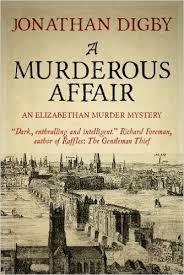 Excellent murder mystery with larger than life characters and a tone in which you can tell the author is enjoying the telling of the tale. John Lovat, the bastard brother of one of Queen Elizabeth's courtiers and always second fiddle to his snooty brother, is employed to solve the mystery of the death of a Portuguese nobleman, and to hush up any scandal that might affect the court.The author has researched the times thoroughly, with detailed knowledge of London streets, the theatres, the waterways and the politics of the day including the taking of slaves and the ruthlessness of piracy on the high seas. There are plenty of false leads and a surprising denouement. All in all an excellent read.
Excellent murder mystery with larger than life characters and a tone in which you can tell the author is enjoying the telling of the tale. John Lovat, the bastard brother of one of Queen Elizabeth's courtiers and always second fiddle to his snooty brother, is employed to solve the mystery of the death of a Portuguese nobleman, and to hush up any scandal that might affect the court.The author has researched the times thoroughly, with detailed knowledge of London streets, the theatres, the waterways and the politics of the day including the taking of slaves and the ruthlessness of piracy on the high seas. There are plenty of false leads and a surprising denouement. All in all an excellent read.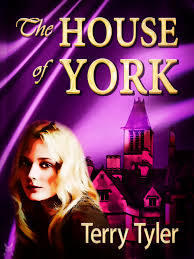 The House of York is loosely based on events during the era of the Wars of the Roses. It includes part of the plot of the Princes in the Tower (albeit updated) and this adds extra interest for history buffs.The events are told from several points of view, mostly unreliable (!) and this family saga is part thriller, part crime, part intrigue, with a good dollop of psychology thrown in. This makes it sound complex, and it is, but it is also a seamless and entertaining read. The voices are clearly delineated, and each character convincing. Like the best historical sagas, Terry Tyler's books are about power. Who owns it, who wants it, and the lengths people will go to to get it. Jealousy, back-stabbing, manipulation are all a part of the game. The ending leaves enough intrigue for this reader to long for for the next instalment so I can find out if Elodie's egomania will finally bring down the edifice of York Towers!
The House of York is loosely based on events during the era of the Wars of the Roses. It includes part of the plot of the Princes in the Tower (albeit updated) and this adds extra interest for history buffs.The events are told from several points of view, mostly unreliable (!) and this family saga is part thriller, part crime, part intrigue, with a good dollop of psychology thrown in. This makes it sound complex, and it is, but it is also a seamless and entertaining read. The voices are clearly delineated, and each character convincing. Like the best historical sagas, Terry Tyler's books are about power. Who owns it, who wants it, and the lengths people will go to to get it. Jealousy, back-stabbing, manipulation are all a part of the game. The ending leaves enough intrigue for this reader to long for for the next instalment so I can find out if Elodie's egomania will finally bring down the edifice of York Towers! 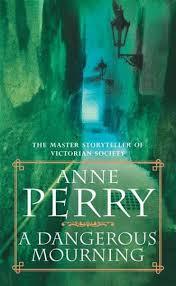 A Dangerous Mourning is the second book in the William Monk Series, set just after the Crimean war, and full of Victorian atmosphere - the foggy Thames, and the complexity of the Victorian legal system. Both these outside forces are mirrored by Monk's mind - his amnesia and how he copes with it, alongside his determination to be better than Mr. Runcorn, his superior, who would be happy to get rid of him from the Force.The plot revolves around the murder of Octavia Moidore, a wealthy aristocrat's daughter, who has been stabbed to death in her bed. Of course in those days there was no fingerprinting, no forensics, and the police force is full of ineptitude. Some of the time Monk is outwitting the system itself, as well as the perpetrator of the crime. Gripping, atmospheric stuff, with a great courtroom drama ending.
A Dangerous Mourning is the second book in the William Monk Series, set just after the Crimean war, and full of Victorian atmosphere - the foggy Thames, and the complexity of the Victorian legal system. Both these outside forces are mirrored by Monk's mind - his amnesia and how he copes with it, alongside his determination to be better than Mr. Runcorn, his superior, who would be happy to get rid of him from the Force.The plot revolves around the murder of Octavia Moidore, a wealthy aristocrat's daughter, who has been stabbed to death in her bed. Of course in those days there was no fingerprinting, no forensics, and the police force is full of ineptitude. Some of the time Monk is outwitting the system itself, as well as the perpetrator of the crime. Gripping, atmospheric stuff, with a great courtroom drama ending.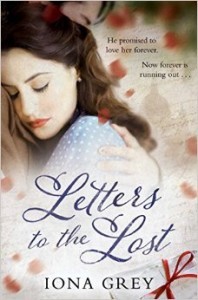 Letters to the Lost is a double romance set during World War Two and today. The plot is built around an empty house in which Jess finds herself after she escapes her violent boyfriend, Dodge. The letters she discovers in the abandoned house describe a sweeping love story that went wrong. At the same time, the airman of the letters is trying to find his long lost sweetheart and hopes she is still alive. With the help of her friend Will, Jess begins to unravel the mystery behind Dan and Stella's wartime story, and in doing so finds a love of her own. Our hopes for a happy ending propel the two narratives along, and anyone looking for an exceptionally well-written romance with true heart and poignancy will love this.
Letters to the Lost is a double romance set during World War Two and today. The plot is built around an empty house in which Jess finds herself after she escapes her violent boyfriend, Dodge. The letters she discovers in the abandoned house describe a sweeping love story that went wrong. At the same time, the airman of the letters is trying to find his long lost sweetheart and hopes she is still alive. With the help of her friend Will, Jess begins to unravel the mystery behind Dan and Stella's wartime story, and in doing so finds a love of her own. Our hopes for a happy ending propel the two narratives along, and anyone looking for an exceptionally well-written romance with true heart and poignancy will love this.
Published on December 10, 2015 03:44
November 23, 2015
The Lancashire Highwayman
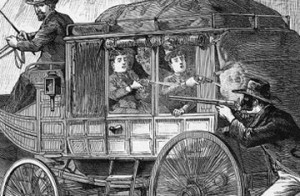
Masked highwayman George Lyon held up the Liverpool mail coach by firing shots and forcing the driver to stop. Then, having robbed the passengers of their valuables, he retired to the pub at Upholland, where he had been drinking earlier. The distraught passengers arrived a little later, bringing with them their tale of robbery and their narrow escape from death, and Lyon must have been entertained by their version of events.
According to local legend, Lyon once tried to hold up a coach that was transporting wages to a coal mine. He was waiting by the side of the road, but it was pouring with rain and the gunpowder in his pistol got soaked. When the coach finally rounded the bend, his pistol failed to fire. The driver, seeing the highwayman, whipped the horses into a gallop and the coach sped by him, throwing up a wave of water, leaving Lyon bedraggled and no richer.Lyon's subsequent career involved more petty crime and burglary until he was eventually caught in 1815. His career ended after burgling Westwood Hall, at Ince near Wigan (below).
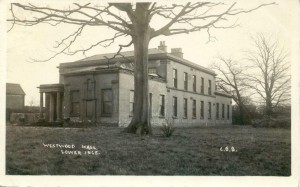 Unknown to Lyon, the landlord of the pub was an undercover constable acting as a 'fence', and the silver that Lyon was trying to sell was easily traceable.
Unknown to Lyon, the landlord of the pub was an undercover constable acting as a 'fence', and the silver that Lyon was trying to sell was easily traceable.Lyon was hanged at Lancaster Castle, but was allowed to be taken back to his home village for burial. Usually it was the custom for executed criminals to be given to local surgeons to dissect, in the interests of medical advancement. Lyons' body was brought back in a thunderstorm, a suitably dramatic end for the Upholland Highwayman.
Lyon called himself a 'prince of thieves' and in time, because of this phrase, he came to be remembered as a Robin Hood type of figure - though there is no evidence at all that he gave anything back to the poor!
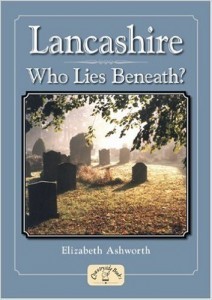 Most of the information about the Upholland Highway man came from a great little book: Lancashire: Who Lies Beneath, by Elisabeth Ashworth, about the stories behind the gravestones of Lancashire churchyards. The book is a treasure trove of fascinating characters and covers many Lancashire graveyards. Visit Elizabeth's website
Most of the information about the Upholland Highway man came from a great little book: Lancashire: Who Lies Beneath, by Elisabeth Ashworth, about the stories behind the gravestones of Lancashire churchyards. The book is a treasure trove of fascinating characters and covers many Lancashire graveyards. Visit Elizabeth's websiteAnd tonight, find out more about the history of Gentlemen of the Road, watch the BBC 4 programme,Highwaymen, Pirates and Rogues
Published on November 23, 2015 02:52



